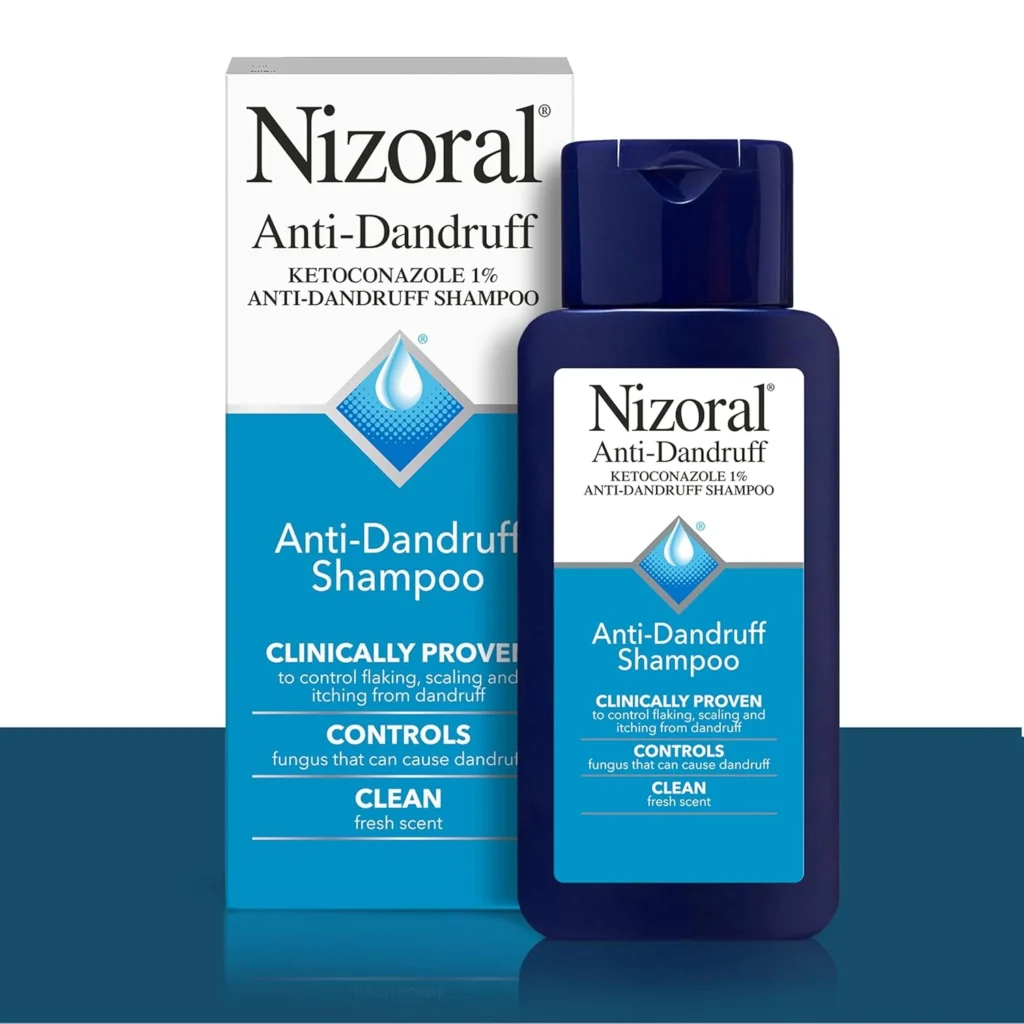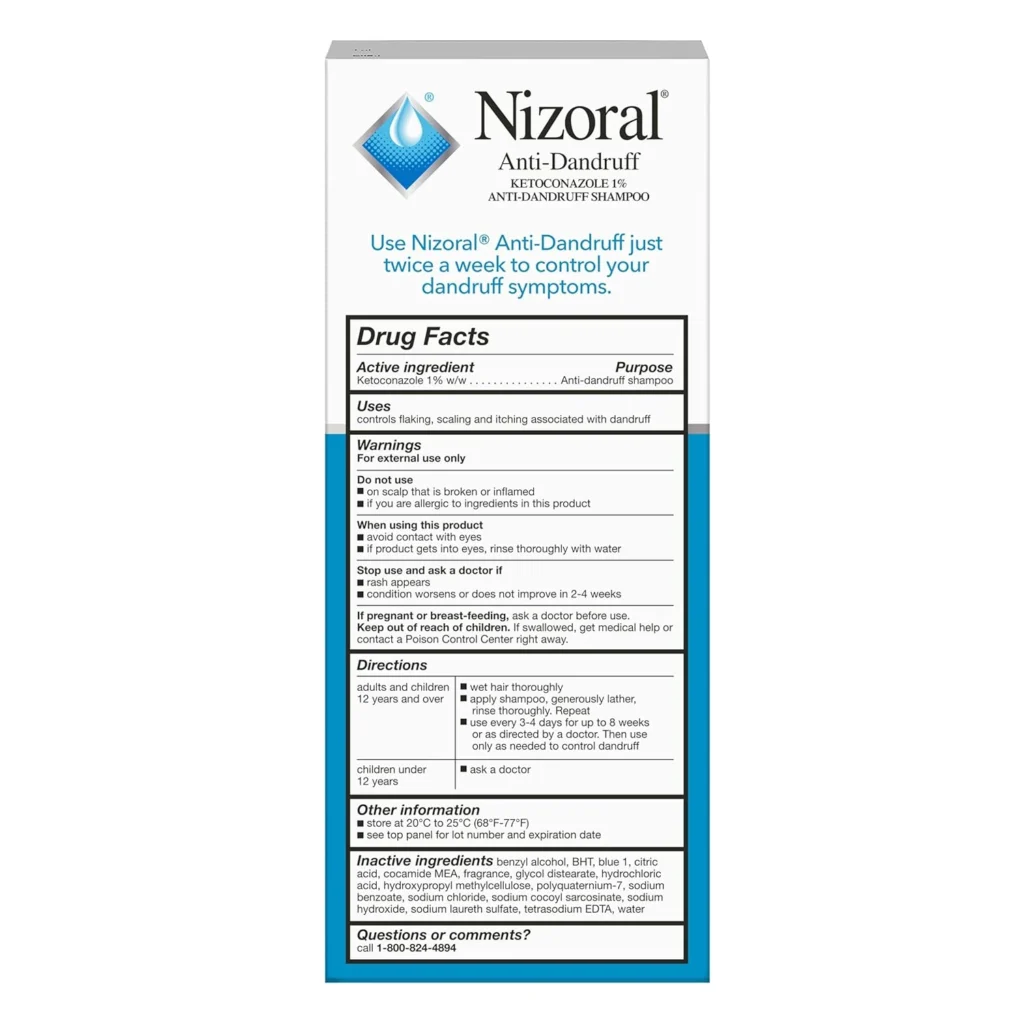If you’re struggling with dandruff or scalp-related issues, Nizoral Anti Dandruff Shampoo is one of the most popular treatments available. This medicated shampoo is trusted for its effectiveness in reducing dandruff, controlling itching, and keeping your scalp healthy. Here’s everything you need to know, from how it works to potential side effects, and whether you can combine it with other hair care products.
What Makes Nizoral Anti Dandruff Effective?

The primary active ingredient in Nizoral is ketoconazole, available in strengths of either 1% (over-the-counter) or 2% (prescription strength). Ketoconazole is an antifungal agent that targets the root cause of dandruff, a fungus called Malassezia, which can cause flaking, itchiness, and inflammation. By reducing the growth of this fungus, Nizoral works to eliminate dandruff and prevent its return.
In addition to ketoconazole, the shampoo contains a variety of inactive ingredients such as sodium laureth sulfate (a cleansing agent), sodium chloride (for thickening), imidurea (a preservative), and fragrance to give the shampoo a pleasant scent.
How to Use Nizoral Anti Dandruff Shampoo
Using Nizoral is simple, but consistency is key to seeing results. Here’s a step-by-step guide:
- Wet your hair and scalp thoroughly before applying the shampoo.
- Use a small amount of Nizoral (about the size of a quarter), and massage it into your scalp. Avoid excessive rubbing, as this could irritate sensitive areas.
- Leave the shampoo on for 3 to 5 minutes. This allows the active ingredient, ketoconazole, to work its way into the scalp and begin treating the fungus.
- Rinse thoroughly, making sure that no shampoo remains on your scalp.
- For best results, use Nizoral two to three times a week. On other days, you can use your regular shampoo. If symptoms persist, consider speaking to a healthcare provider for further advice.
Nizoral Anti Dandruff Shampoo Ingredients

Active Ingredient:
- Ketoconazole (1% or 2%): The key antifungal agent that helps control dandruff by targeting the fungus Malassezia, which is a common cause of dandruff.
Inactive Ingredients:
- Sodium Laureth Sulfate: A surfactant that helps the shampoo lather and cleanse the scalp.
- Cocamide MEA: A foaming agent derived from coconut oil that enhances the texture and thickness of the shampoo.
- Sodium Chloride: Commonly known as salt, it helps to thicken the shampoo.
- Glycol Distearate: An emollient that gives the shampoo a smooth, pearly appearance and adds conditioning properties.
- Fragrance: Added to give the shampoo a pleasant smell.
- Polyquaternium-7: A conditioning agent that reduces static and adds shine to the hair.
- Hydrolyzed Collagen: Helps to improve the texture and manageability of hair by moisturizing and strengthening it.
- Laureth-2: Helps control the thickness and consistency of the shampoo.
- Disodium Laureth Sulfosuccinate: A mild surfactant used to cleanse and foam without being too harsh on the skin.
- Imidurea: A preservative that prevents microbial contamination.
- FD&C Blue No. 1: A colorant used to give the shampoo its distinctive blue color.
These ingredients work together to ensure the shampoo effectively treats dandruff while keeping hair clean and manageable.
Benefits of Using Nizoral AD Shampoo
Nizoral stands out as a go-to solution for a variety of scalp concerns. Its main benefits include:
- Effective dandruff control: Nizoral targets the fungal cause of dandruff, providing lasting relief from flakes and itching.
- Reduces scalp irritation: Many users report significant improvement in itching and redness after just a few uses.
- Long-lasting effects: Even after washing with regular shampoo, Nizoral’s effects can last for days, keeping dandruff at bay for longer periods.
- Suitable for all hair types: Whether you have oily, dry, or combination hair, Nizoral can help without affecting your hair texture or color.
Are There Any Side Effects?
Like any medicated product, Nizoral can cause some side effects, although they are generally mild. Potential side effects include:
- Mild skin irritation: Some users may experience itching, dryness, or a slight burning sensation after using the shampoo.
- Hair texture changes: In rare cases, people have reported changes in hair texture, such as slight dryness or frizziness, which can be mitigated by using a conditioner.
- Hair thinning: Although very uncommon, some users may notice mild hair shedding, but this is usually temporary and resolves as the scalp adjusts to the treatment.
If you experience any severe reactions, such as swelling, intense burning, or rash, discontinue use and consult a doctor immediately.
Can Nizoral AD Shampoo Be Used With Other Shampoos?
Yes, you can definitely combine Nizoral with other shampoos. Since Nizoral is a treatment shampoo, it’s not meant to replace your daily shampoo permanently. Here’s how you can alternate between products:
- On treatment days: Use Nizoral two to three times per week to tackle dandruff.
- On non-treatment days: You can use your regular shampoo and conditioner to maintain overall hair health and moisture. If you feel your hair becomes a bit dry after using Nizoral, a moisturizing conditioner can help restore softness and balance.
Market Price of Nizoral AD Shampoo
Nizoral is widely available both in pharmacies and online. Its pricing can vary depending on where you’re located and whether you’re purchasing the 1% or 2% version.
- In the U.S.: The average price for a 4 oz (120 ml) bottle of Nizoral (1% strength) is around $15 to $25.
- In India: Nizoral is available for around ₹500 to ₹800, depending on the product strength and retailer.
Keep in mind that the 2% version may require a prescription in many countries, so consult a doctor if you feel you need stronger treatment.
Conclusion
Nizoral Anti Dandruff Shampoo is a powerful solution for anyone dealing with dandruff or other scalp conditions related to fungal infections. With regular use, it can reduce flakes, control itchiness, and leave your scalp feeling healthier. Whether you use it on its own or in combination with your regular shampoo, it’s a reliable option for managing dandruff long-term.
By following the instructions and being aware of potential side effects, you can confidently use Nizoral to restore balance to your scalp and enjoy a flake-free life.


